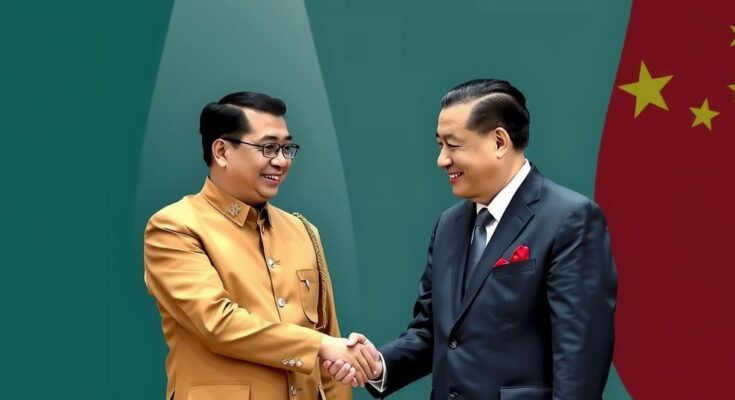Indonesia’s new President, Prabowo Subianto, advocates for collaboration with China during his first overseas trip, emphasizing partnership over confrontation. This follows $10 billion in agreements signed in Beijing and comes prior to meetings with U.S. officials. The bilateral discussions also aim to deepen cooperation in security and other vital areas amidst regional challenges.
Indonesia’s new President, Prabowo Subianto, has emphasized the importance of collaboration over confrontation in relations with China following a significant business forum in Beijing, where he unveiled $10 billion in new agreements. He expressed his desire for Indonesia to partake in China’s rise as a global economic and civilizational power. Subianto remarked, “We must give an example that in this modern age, collaboration — not confrontation — is the way for peace and prosperity.” He is currently on his first overseas trip, which will include discussions with U.S. officials in Washington, amid ongoing tensions regarding China’s growing influence in the region.
During his discussions with Chinese President Xi Jinping, they agreed to reinforce bilateral ties, with security cooperation now regarded as a crucial area of partnership alongside political and economic collaboration. Subianto made it clear that Indonesia has historically adhered to a nonaligned stance in international relations, presenting respect towards all major world powers. Although Indonesia has avoided formal disputes with China, it has faced territorial concerns, particularly in the South China Sea, leading to recent incidents involving Chinese vessels.
China’s substantial investment in Indonesia includes initiatives in mining and infrastructure, notably the newly constructed high-speed railway between Jakarta and Bandung. However, Indonesian garment manufacturers are facing challenges due to an influx of inexpensive Chinese goods, which has resulted in factory closures and calls for protective tariffs. In navigating these economic dynamics, the Indonesian government aims to balance domestic producer interests with the need to maintain positive relations with its chief trading partner.
The context surrounding Indonesia’s recent shift under its new leadership reflects both regional dynamics and Indonesia’s strategic approach towards major global powers, particularly China and the U.S. Historically, Indonesia has maintained a nonaligned position, promoting collaborative efforts over confrontational stances. China has been a significant partner in terms of investment, particularly in infrastructure, while also creating challenges for local industries. President Subianto’s approach signifies an intent to harness economic opportunities while navigating the complexities of international relations.
In summary, President Prabowo Subianto’s call for collaboration with China marks a pivotal moment in Indonesia’s foreign policy, aiming to foster diplomatic ties while addressing domestic economic challenges. His outreach signifies Indonesia’s strategic intent to leverage its nonaligned status to navigate the intricate balance between China and the United States. By promoting cooperation in areas such as security and economic partnerships, Indonesia seeks to enhance its regional influence and stability.
Original Source: abcnews.go.com




